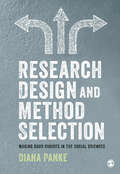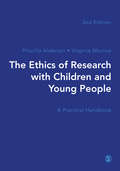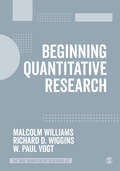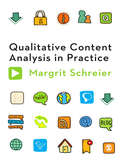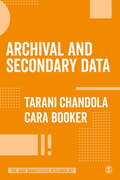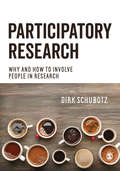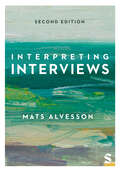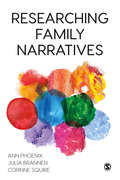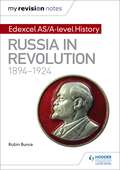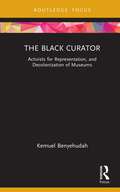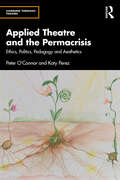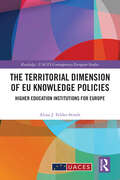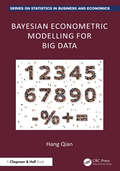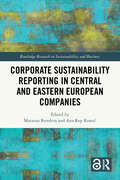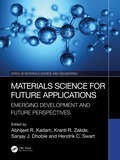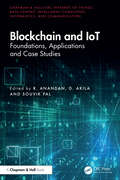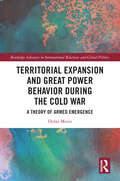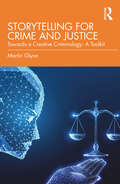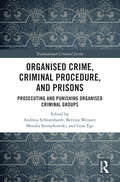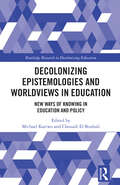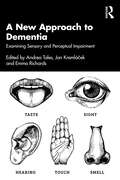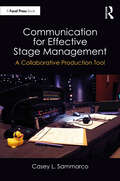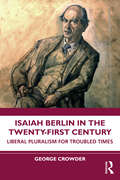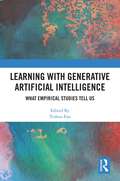- Table View
- List View
Research Design & Method Selection: Making Good Choices in the Social Sciences
by Diana PankeHeavily grounded in helping students make the best choices for their projects, this book explores how to develop and work with theory, research questions, and method selection to build solid, logical proposals and move from research concepts to fully realized designs. Rather than rushing initial planning stages or reverse engineering questions from preferred methods, it encourages students to challenge unconscious biases around method selection and analysis and provides step-by-step guidance on choosing a method that is in-line with the question being explored. Focused on the role of the researcher within research design, it stresses the need to consider the theoretical underpinnings of research and not just practical issues when designing a project. It provides a sophisticated toolkit to understand: - The critical issues associated with both qualitative and quantitative methods - The approach that works best for specific research questions - How design choices can affect practice. Perfect for upper undergraduate and postgraduate students, this book will instil confidence and good decision making to ensure constructively informed design and practice.
The Ethics of Research with Children and Young People: A Practical Handbook
by Priscilla Alderson Virginia MorrowA practical guide to carrying out ethical research with children and young people, this practical handbook examines the ethical questions that arise at each stage of research, from first plans to dissemination and impact. Illustrated with case studies from international and inter-disciplinary research, it offers advice for addressing each ethical question, issue or uncertainty. Including: • A showcase of the best practice on a range of topics including data protection • Practical guidance for responding to recent global changes in policy and practice in ethics and law • Discussion of the challenges and opportunities of digital research with children The updated second edition continues to provide an excellent resource for those exploring the old, current and new consensuses on the ethics of researching with children.
Beginning Quantitative Research (The SAGE Quantitative Research Kit)
by Malcolm Williams Richard D. Wiggins W.P. VogtThis concise text provides a clear and digestible introduction to completing quantitative research. Taking you step-by-step through the process of completing your quantitative research project, it offers guidance on: · Formulating your research question · Completing literature reviews and meta-analysis · Formulating a research design and specifying your target population and data source · Choosing an appropriate method and analysing your findings Part of The SAGE Quantitative Research Kit, this book will give you the know-how and confidence needed to succeed on your quantitative research journey.
Qualitative Content Analysis in Practice
by Margrit SchreierQualitative content analysis is a powerful method for analyzing large amounts of qualitative data collected through interviews or focus groups. It is frequently employed by students, but introductory textbooks on content analysis have largely focused on the quantitative version of the method. In one of the first to focus on qualitative content analysis, Margrit Schreier takes students step-by step through: - creating a coding frame - segmenting the material - trying out the coding frame - evaluating the trial coding - carrying out the main coding - what comes after qualitative content analysis - making use of software when conducting qualitative content analysis. Each part of the process is described in detail and research examples are provided to illustrate each step. Frequently asked questions are answered, the most important points are summarized, and end of chapter questions provide an opportunity to revise these points. After reading the book, students are fully equiped to conduct their own qualitative content analysis. Designed for upper level undergraduate, MA, PhD students and researchers across the social sciences, this is essential reading for all those who want to use qualitative content analysis.
Archival and Secondary Data (The SAGE Quantitative Research Kit)
by Tarani Chandola Cara BookerData archives provide rich and expansive sources of information for researchers. This book highlights the utility of secondary data analyses whilst showing you how to select the right datasets for your study, and in turn get the most out of your research. Topics include: · Generating your research question · Selecting appropriate datasets and variables · Examining univariate, bivariate and multivariate associations · Visualisng your data with tables and graphs Part of The SAGE Quantitative Research Kit, this book boosts students with know-how and confidence, to help them succeed on their quantitative research journey.
Participatory Research: Why and How to Involve People in Research
by Dirk SchubotzGoing beyond a general introduction to offer a hands-on guide, Participatory Research empowers students to feel confident understanding and applying participatory methods to their research projects. It takes an accessible approach to explaining the theory that grounds participatory research and offers students practical strategies for how and when to choose and apply a wide range of these methods. Comprehensive yet easy to understand, this book: · Gives students a thorough grounding in the history and theoretical issues surrounding each method · Showcases participatory research in action through extensive on-the-ground case studies · Highlights the importance of ethics in research design, offering guidance on dealing with sensitive considerations in participatory research With a sustained focus on the impact of digital technologies, this book tackles head-on the need to re-assess the way we involve people in contemporary research. It is an essential guide to better research practice for students and researchers across the social sciences.
Interpreting Interviews
by Mats AlvessonThrough the use of eight original metaphors for understanding what may happen in interviews and what may guide the interviewee (more than telling the truth or revealing experiences), the reader is encouraged to do interviews in clever ways. This text enables you to question the interpretive nature and theoretical underpinnings of the interview method, and of the knowledge which is conveyed through it. The updated second edition includes new content on: • How to avoid traps in interviews • How to use interviewees with experience and insight • How to work creatively with generative material • The value of repeat interviewing over time • The importance of supplementing interviews with other methods • Possibilities of interview-based research accompanied by examples This text is essential reading for upper undergraduate and postgraduate students of qualitative methods, and researchers looking to more clearly conceptualize their interviewing practice and explore its theoretical basis. Mats Alvesson is professor at University of Bath and is also affiliated with Lund University, Stockholm School of Economics and Bayes Business School.
Researching Family Narratives
by Corinne Squire Julia Brannen Ann PhoenixThis edited book guides students and researchers through the processes of researching everyday stories about families. Showcasing the wide range methods and data sources currently used in narrative research, it features: Examples of real research into historical and contemporary family practices from around the world. Coverage of both traditional and cutting-edge topics, like multi-method approaches, online research, and paradata. Practical advice from leading figures in the field on how to incorporate these methods and data sources into family narrative research. With accessible language and features that help readers reflect on and internalize key concepts, this book helps readers navigate researching family lives with confidence and ease.
Beginning Quantitative Research (The SAGE Quantitative Research Kit)
by Malcolm Williams Richard D. Wiggins W.P. VogtThis concise text provides a clear and digestible introduction to completing quantitative research. Taking you step-by-step through the process of completing your quantitative research project, it offers guidance on: · Formulating your research question · Completing literature reviews and meta-analysis · Formulating a research design and specifying your target population and data source · Choosing an appropriate method and analysing your findings Part of The SAGE Quantitative Research Kit, this book will give you the know-how and confidence needed to succeed on your quantitative research journey.
My Revision Notes: Edexcel AS/A-level History: Russia in revolution, 1894-1924
by Robin BunceExam Board: EdexcelLevel: AS/A-levelSubject: HistoryFirst Teaching: September 2015First Exam: June 2016Target success in Edexcel AS/A-level History with this proven formula for effective, structured revision; key content coverage is combined with exam preparation activities and exam-style questions to create a revision guide that students can rely on to review, strengthen and test their knowledge.- Enables students to plan and manage a successful revision programme using the topic-by-topic planner- Consolidates knowledge with clear and focused content coverage, organised into easy-to-revise chunks- Encourages active revision by closely combining historical content with related activities- Helps students build, practise and enhance their exam skills as they progress through activities set at three different levels- Improves exam technique through exam-style questions with sample answers and commentary from expert authors and teachers- Boosts historical knowledge with a useful glossary and timeline
The Black Curator: Activists for Representation, and Decolonization of Museums (Museums in Focus)
by Kemuel BenyehudahThe Black Curator highlights the role that Black curators have long played in advocating for black artists and social changes and argues that they made a significant contribution to the democratization of museums over the last 150 years.Drawing on oral testimonies and archival research, this book examines how black curatorial activist practices emerged as a social and imaginative response to racism across various museum contexts. Exploring the work of black curators at three different museums, Benyehudah traces a lineage from black curators in the 19th century to those currently working in curatorial roles. Analysis of these case studies and the use of ideas from museum studies, critical race theory, and art history also enable the author to demonstrate how black curatorial practice was and is distinct from Eurocentric forms of curating black art. Explaining that the black curatorial lens was used in the process of establishing counter‑archives, the author also demonstrates that it has played – and continues to play – a vital role in the decolonization of museums.Offering compelling ways to look at the relationship between black curators and legacies of colonialism in museums, The Black Curator will be essential reading for scholars, students, and museum practitioners.
Applied Theatre and the Permacrisis: Ethics, Politics, Pedagogy and Aesthetics (Learning Through Theatre)
by Peter O'Connor Katy PérezResponding to the global state of permacrisis, this book explores the relationship between applied theatre and disaster.For millennia communities have learnt to live alongside disaster through their arts making. Building on the basis of this ancestral knowledge this book explores the current uses of applied theatre in times of constant crisis. Using a critical disaster studies lens, the authors recognise the role of governments and multinational businesses in profiteering from and manipulating for their own advantage the misery caused by disasters. Case studies of different stages of disaster, from risk reduction and disaster preparedness through to the almost inevitable resistance to failed government intervention, illustrate the possibilities and limitations of applied theatre and other art forms to navigate these times. Applied theatre is seen as a vital act of aesthetic and political hope.At a time of never-ending, overlapping disasters, this book will be important to researchers and postgraduate students working in applied theatre and disaster research in the social sciences. It will also appeal to applied arts practitioners who work in disaster zones and with relief organisations.
The Territorial Dimension of EU Knowledge Policies: Higher Education Institutions for Europe (Routledge/UACES Contemporary European Studies)
by Alina J. Felder-StindtThis book expands our understanding of the so-far-overlooked territorial dimension of the EU’s knowledge policies crossing policy area boundaries.It examines how EU regional policy, endowed with substantial financial resources, influences the comparatively weakly endowed EU higher education policy. The analysis finds that (sub)national actors not only implement EU regional policy instruments but also actively shape EU policies. By showing this co-shaping transcends policy fields, the book provides new insights into the (feedback) effects of EU-funded cross-border cooperation. It shows that regionalization endeavours are political projects of regional and EU decision-makers, which remain exposed to Europeanization processes in the long term.This book is of key interest to scholars and students of European policymaking, EU integration, EU regional policies, EU public policy courses and more broadly to geography/development, social policy, governance and education policies.
Bayesian Econometric Modelling for Big Data (Chapman and Hall/CRC Series on Statistics in Business and Economics)
by Hang QianThis book delves into scalable Bayesian statistical methods designed to tackle the challenges posed by big data. It explores a variety of divide-and-conquer and subsampling techniques, seamlessly integrating these scalable methods into a broad spectrum of econometric models.In addition to its focus on big data, the book introduces novel concepts within traditional statistics, such as the summation, subtraction, and multiplication of conjugate distributions. These arithmetic operators conceptualize pseudo data in the conjugate prior, sufficient statistics that determine the likelihood, and the posterior as a balance between data and prior information, adding an intriguing dimension to Bayesian analysis. This book also offers a deep dive into Bayesian computation. Given the intricacies of floating-point representation of real numbers, computer programs can sometimes yield unexpected or theoretically impossible results. Drawing from his experience as a senior statistical software developer, the author shares valuable strategies for designing numerically stable algorithms.The book is an essential resource for a diverse audience: graduate students seeking foundational knowledge in Bayesian econometric models, early-career statisticians eager to explore cutting-edge advancements in scalable Bayesian methods, data analysts struggling with out-of-memory challenges in large datasets, and statistical software users and developers striving to program with efficiency and numerical stability.
Corporate Sustainability Reporting in Central and Eastern European Companies (Routledge Research in Sustainability and Business)
by Marzena Remlein Ana Rep RomićThis book comprehensively analyses non-financial reporting, specifically sustainability reporting, in Central and Eastern European (CEE) countries. It identifies key trends and common practices among regional companies.The book examines the comprehensiveness and quality of sustainability reporting across fifteen countries by drawing on academic literature, regulatory reports, corporate sustainability disclosures, and scientific studies. The authors explore the benefits of sustainability reporting, including enhanced stakeholder trust, improved reputation, and stronger commitments to environmental, social, and governance practices. Additionally, the book highlights the link between sustainability reporting and improved financial performance. Practical recommendations are provided to help companies in the CEE region align their reporting practices with the latest Corporate Sustainability Reporting Directive (CSRD) requirements.This monograph is an invaluable resource for students and scholars of sustainability reporting, corporate social responsibility, and sustainable business. It is equally essential for professionals and companies seeking to enhance their sustainability reporting and compliance in the CEE region.
Material Science for Future Applications: Emerging Development and Future Perspectives (Series in Materials Science and Engineering)
by Abhijeet R. Kadam Kranti R. Zakde Swart, Sanjay J. Dhoble and Hendrik C.Materials Science for Future Applications: Emerging Development and Future Perspectives offers an overview of the materials used for progressive energy systems, such as solar cells, luminescent energy, sensors and detectors and energy storage devices. Today’s worldwide energy and materials production is going through important changes, which are developing novel prospects. These developments and innovative technologies are changing the way energy is manufactured, transported and spent.The materials emphasis in this book conveys a new perspective and highlights the many challenges that are often overlooked in other literature. An understanding of these challenges can be critical when working with new energy material technologies. Particular devotion is given to the key materials and their conversion productivity, extensive duration of permanency, materials expenses and energy materials sustainability.Materials Science for Future Applications offers a comprehensive introduction for students and researchers, in both academia and industry, who are interested in understanding the properties of emerging materials and their challenges.
Blockchain and IoT: Foundations, Applications and Case Studies (Chapman & Hall/CRC Internet of Things)
by R Anandan, D Akila, and Souvik PalThis book offers a detailed exploration of the transformative potential of the Internet of Things (IoT) and Blockchain in reshaping industries. Through a combination of theoretical foundations, practical case studies, and innovative applications, it highlights how these cutting-edge technologies can revolutionise business models, enhance operational efficiency, and foster innovation. This is a helpful guide for scholars, researchers, and professionals engaged in research on the Internet of Things, Artificial Intelligence, Machine Learning, Blockchain, and their applications at the industry level. Explains how IoT devices can leverage Blockchain technology to enhance security, transparency, and efficiency in data management and transactions Explores the security challenges faced by IoT devices and how Blockchain can address these challenges by providing a decentralised and tamper-resistant platform for data exchange and storage Investigates the potential of cloud-based IoT platforms, analytics, protocols, and business models and renovate the workforce with Industry revolution Discusses how companies can leverage the data generated by IoT devices securely through Blockchain-based data marketplaces Provides real-world examples and case studies of successful implementations of IoT and Blockchain technologies across different industries such as healthcare, manufacturing, logistics, and energy
Territorial Expansion and Great Power Behavior During the Cold War: A Theory of Armed Emergence (Routledge Advances in International Relations and Global Politics)
by Dylan MotinMotin examines great powers’ reactions to the rise of new powers in bipolarinternational systems by exploring an understudied problem: the rarity of armedemergence after 1945.The book focuses on Egypt, Iraq, Syria, and Vietnam; the few minor powersthat attempted to emerge as great powers through force during the Cold War.Geography and existing powers’ reactions are analyzed as the two key factorsdetermining a nation’s attempts at territorial expansion to achieve power on theglobal political stage. This systematic investigation of previously overlooked caseshas profound implications for the scholarship on the rise and fall of great powers.In a context where territorial conquest is returning worldwide, scholars studyinginternational relations, international security, and strategic studies should findvaluable insights in this realist take.
Storytelling for Crime and Justice: Towards a Creative Criminology: A Toolkit
by Martin GlynnWhether it is doing a TEDx, presenting a podcast, sharing on social media, presenting at a conference, or pitching to a potential funder, engaging with storytelling and performance is now a prerequisite of an academics ‘modus operandi.’ Exploring the relationship between and the key concepts associated with storytelling and performance, crime, and criminology, this book offers practical tips and insights into creative methods for presenting research, disseminating criminological knowledge, giving lectures, and developing pedagogy.The book presents a reflexive account of the author's experiences of using creativity with incarcerated men and women. Drawing on a range of topics including ethical storytelling, presentation literacy, poetic inquiry, staging ethno-drama, crime fiction, and auto-ethnography, it makes a clear and compelling case for a creative criminology and a performative social science. Written by a seasoned criminologist, theatre director, storyteller, and dramatist, this is essential reading for all those interested in using creative methods of knowledge as a tool to explore the complex landscape of crime and justice.
Organised Crime, Criminal Procedure, and Prisons: Prosecuting and Punishing Organised Criminal Groups (Transnational Criminal Justice)
by Andreas Schloenhardt, Bettina Weisser, Monika Stempkowski, and Gian EgeThis book explores a range of topics relating to the prosecution and trial of organised crime and the punishment, especially imprisonment, of members of organised criminal groups. Organised crime poses particular challenges to the criminal justice system. While much of the attention of policy-makers, legislators, law enforcement, and the media is on criminalisation and investigation, much less attention, including academic analysis, has been devoted to the unique problems posed by organised crime to criminal procedure and to the prison system. This book gives particular attention to the role and powers of prosecutors and the judiciary, measures relating to criminal proceedings, international cooperation, sentencing, and the situations in prisons. The book is intended to be a valuable guide for academics, researchers and policy-makers working in the areas of organised crime, international criminal justice, criminal procedures, and prisons.
Decolonizing Epistemologies and Worldviews in Education: New Ways of Knowing in Education and Policy (Routledge Research in Decolonizing Education)
by Chouaib El Bouhali Michael KariwoThis edited volume examines the decolonization of worldviews and ways of knowing in education and educational policy. It critically challenges the Western interpretation of epistemology and ontology, providing a platform for contributors to demonstrate how concepts of decolonization, knowledge and worldviews are understood, as well as the impact of these understandings in creation of policies and practices in education and pedagogy. It also offers insight into related themes on student resilience, English language, the internationalization of western knowledge, indigenous paradigms, and curriculum transformation. Chapter authors present new understandings of decolonizing knowledge and diversity, analysis of non-Western and indigenous epistemologies and worldviews, and examples of implementation of equity in policy and education through case studies. Creating and initiating a platform for wider debate, it will ultimately appeal to scholars, researchers, policy makers and educational leaders concerned with decolonizing education and policy in North America and beyond, and with interests in indigenous education, decolonizing education, sociology of education, and philosophy of education.
A New Approach to Dementia: Examining Sensory and Perceptual Impairment
by Emma Richards Andrea Tales Jan KremláčekA New Approach to Dementia: Examining Sensory and Perceptual Impairment is a groundbreaking work which highlights the non-memory impairments of the dementias to improve both early recognition of dementia and clinical diagnosis, as well as interventions and care. It focuses clinical attention on the significant evidence supporting the existence of many types of sensory and perception-related changes/abnormalities sometimes at the early stages of the disease and throughout its progression.Providing a holistic overview of the field, the book includes self-reports of people with dementia and caregivers, alongside an in-depth discussion of the application of the findings about non-memory impairments to clinical care and management. It leads a movement to address the over-focus on memory function in dementia and ageing, arguing for the need to test sensory and perceptual abnormalities to improve clinical practice and research into, and the care and support of, people living with dementia and associated disorders.With its mix of scientific, and clinical and real-life relevance, this book is essential for clinicians and researchers specialising in ageing and dementia as well as carers working with people living with dementia and students of neuropsychology/neurocognition, medicine and health and social care.
Communication for Effective Stage Management: A Collaborative Production Tool
by Casey L. SammarcoCommunication for Effective Stage Management: A Collaborative Production Tool provides a comprehensive examination of communication theory through the lens of effective stage management and offers ideas and methods for stage managers to enhance their communicative presence throughout a theatrical process.This book offers new, extensive in-depth discussion of communication techniques and how these methods apply to the role of the theatrical stage manager as the facilitator of information. Part I dives into the methods and principles of business communication employed by stage managers and discusses how these techniques are best implemented throughout a theatrical process, all supported with real-life examples. It also offers discussion questions and resources to enhance the content and encourages the reader to self-analyze their own communication techniques during the production process. Part II contains excerpts from other industry professionals who offer their own unique perspective as to the collaborative and communicative work of stage managers and how their own artistic careers are impacted by the communication systems of a stage management team.This book is best suited for advanced stage management students, professional theatre practitioners, and theatrical educators.
Isaiah Berlin in the Twenty-First Century: Liberal Pluralism for Troubled Times
by George CrowderIsaiah Berlin is well known as a defender of liberal democracy in the Cold War. In this path-breaking study, George Crowder argues that Berlin’s ideas have application beyond their original context to the problems of our own time.Focusing on three central themes – liberty, identity, and value pluralism – Crowder presents a fresh interpretation of Berlin, exposing the misunderstandings of critics, especially those who ignore Berlin’s pluralist foundation. Although genuine problems remain, these can be alleviated by revising and extending Berlin’s view to construct an updated liberal pluralism. Together with Berlin’s own arguments, liberal pluralism is then brought to bear on a range of current concerns, including neoliberalism, identity politics, populism, international relations, religion, feminism, climate change, and global pandemics. The resulting outlook is complex, realistic, humane, and positive.Isaiah Berlin in the Twenty-First Century represents a new departure in the study of Berlin, value pluralism, and liberal thought more generally. It is essential reading for researchers and advanced students in these fields, but its wide range will appeal to anyone interested in the values and politics of our troubled times.
Learning with Generative Artificial Intelligence: What Empirical Studies Tell Us
by Yizhou FanThis book delves into the core of education’s digital transformation, presenting a thorough and empirical examination of generative artificial intelligence (GenAI)’s impact beyond the theoretical and fragmented insights prevalent in current discourse.Drawing from peer-reviewed and extensive empirical studies, the contributors aim to unveil the multifaceted effects of GenAI (particularly ChatGPT) on learning. They navigate through topics of interaction, assessment, emotion, effect and efficiency, meta-cognition, and ethics, offering a comprehensive exploration of GenAI’s educational implications. This book presents a closed loop of learning theory, multimodal data, and learning analytics technology. Furthermore, this book builds and proposes core conceptual models for future learning and identifies potential research directions.This book will serve as a foundational reference for educators seeking innovative learning and teaching methods and for researchers and technologists who seek to push the boundaries of educational technology and related areas.
